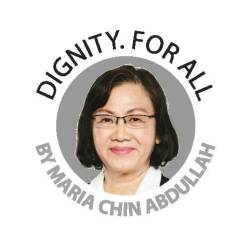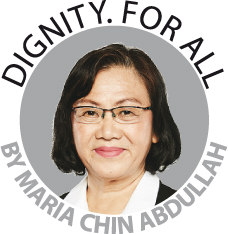THE rising costs of living, and the burden of a crippled economy brought about by the abuses and mismanagement of the previous government is felt by everyone.
In response, the present government decided to implement Bantuan Sara Hidup (BSH), a scaled-down and more targeted version of BR1M (1Malaysia People’s Aid).
This is just one of many socio-economic support mechanisms that the government has implemented to deal with poverty. However socio-economic support mechanisms like the BSH are not sustainable and are not meant to be long-term solutions.
Economic problems cannot be solved with handouts especially if the problems are structural and institutional.
Cash aid schemes like the BSH are unsustainable and Prime Minister Tun Dr Mahathir Mohamad has noted that it is “wrong as it makes people dependent on the government for help all the time. Instead of working hard, Malaysians will sit back and wait for these handouts”.
Deputy Prime Minister Datuk Seri Dr Wan Azizah Wan Ismail echoed this when she said Malaysia needed a social welfare approach that would help create opportunities for the poor to become self-reliant and empower communities to contribute to the nation’s economy.
Economic Affairs Minister Datuk Seri Azmin Ali said cash handouts should eventually be stopped because there were elements of corruption in it. He called for new approaches and initiatives for an economic direction that would focus on making people’s lives better.
However, we must recognise there is a need to support the most vulnerable – the unemployed, sick, disabled and elderly – who need socio-economic support.
Speaking to some of the welfare recipients, we find that regardless of whether they are employed, most of them are not just providing for their needs but an extended family.
A lot of these recipients live in big households and need to support their children or elderly parents who are unable to work in their old age. There are also parents who have come out of retirement to take care of their sick children.
No matter how much someone in the B40 category works, there are limits on how much that person can earn. What if the reality is that many are just one major accident or illness away from being pushed into a life of poverty?
Would that person be able to pay for cancer treatment for a family member, provide a good education for her child and still have money left over for a decent living? As tempting as it is to say that these people must work harder, we must consider that we may be living in a society that has failed them, and that the B40 may be trapped in a cycle of poverty.
Some spend even as little as RM200-RM300 monthly, mostly on food, and yet even with the socio-economic aid, many end up borrowing money from friends, family and other less forgiving sources.
Across Asia, the last 10 years has seen a reversal in the traditional trend opposing state-run social safety net initiatives. The idea has become more popular as there is worry about persistent poverty, rising inequality and rising demands from citizens for social safety net instruments including pensions, health insurance and access to facilities.
Indonesia, South Korea and even Singapore are expanding their national healthcare plans and looking at social safety nets for the poor. Hong Kong has proposed a negative income tax after a low-income working allowance was found to be insufficient.
It is also hard to overlook the Nordic model where a large welfare state is supported by a social market model. There is job security, financial security and economic distribution. Citizens have access to free state education system, free healthcare, affordable childcare, and a functioning public transport system.
There is also more radical idea of providing universal basic income.
Although the idea to provide “unconditional basic income” that guarantees “a human existence and participation in public life for the whole population” was overwhelmingly rejected by voters in Switzerland in 2016, this did not stop a village from proceeding with a trial to provide an unconditional basic income of up to 2,500 Swiss francs a month to participants regardless of whether they are working or not. Finland and the Netherlands have pilot projects that look at universal basic income for people from low-income groups.
India’s Prime Minister Narendra Modi in 2017 toyed with the idea of a universal basic income to replace the Indian government’s 950 welfare programmes.
We are in no way ready for such a national basic income. This programme is too expensive and being untargeted would also benefit the rich. However, it is time for Malaysia to recognise there is a diminishing workforce who might not be able to support themselves and their families without help from the state.
A comprehensive social safety net will ensure social stability and economic development. To achieve this, the government will have to consider the possibility of intervention when it comes to basic needs of the elderly, sick, the disabled, and children.
We cannot run away from investing in socio-economic support mechanisms however the implementation will be costly. The government must also look at reliable sources of income including how to develop a progressive corporate taxation system so that all Malaysians will have equal access to the social safety net.
An example would be Sweden’s institutional care model which promotes the idea of equality of results. Despite citizens paying high taxes, they don’t have to worry about insurance, medical bills and education. The idea of “decommodification of utilities” in Sweden’s institutional care has enabled it to develop universal socio-economic support policies.
Already it is projected that the number of Malaysians above the age of 60 will make up 20% of the population by 2040. The government must develop its long-term strategy now and come up with a comprehensive social safety net that looks beyond immediate economic concerns.
Comments: letters@thesundaily.com
















